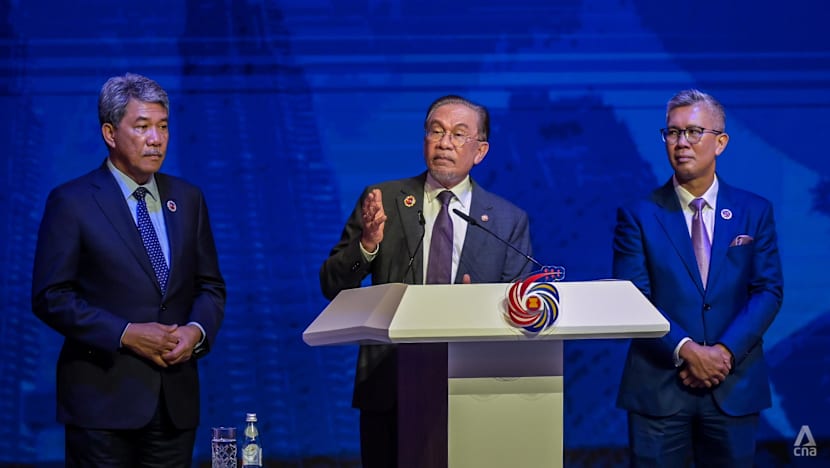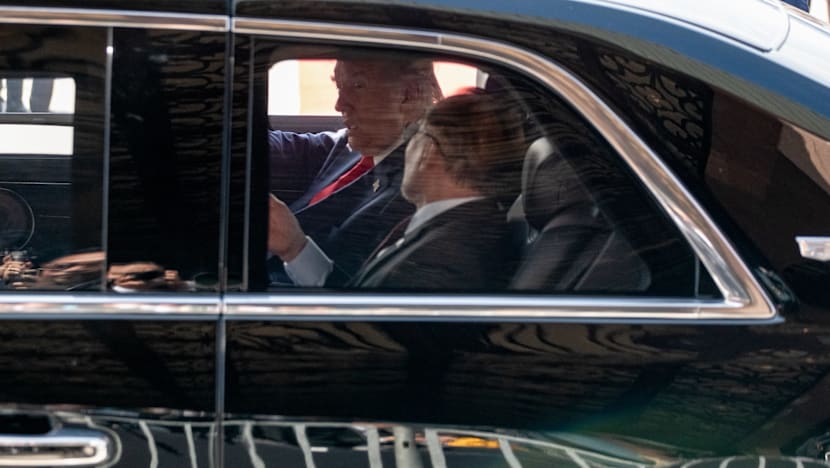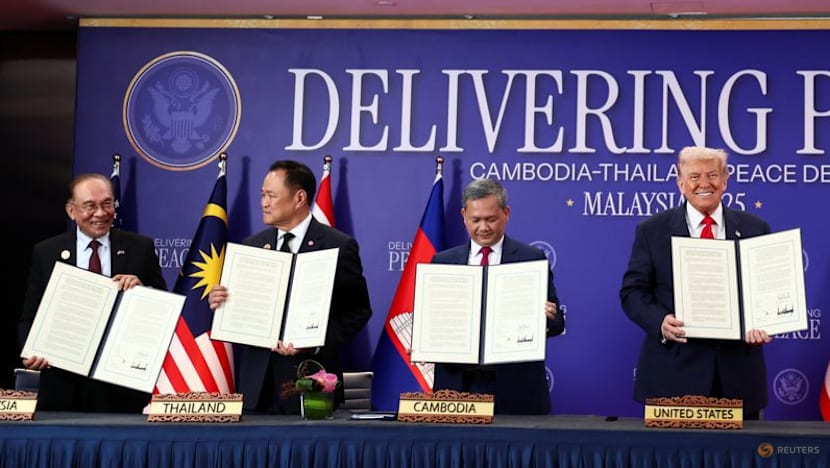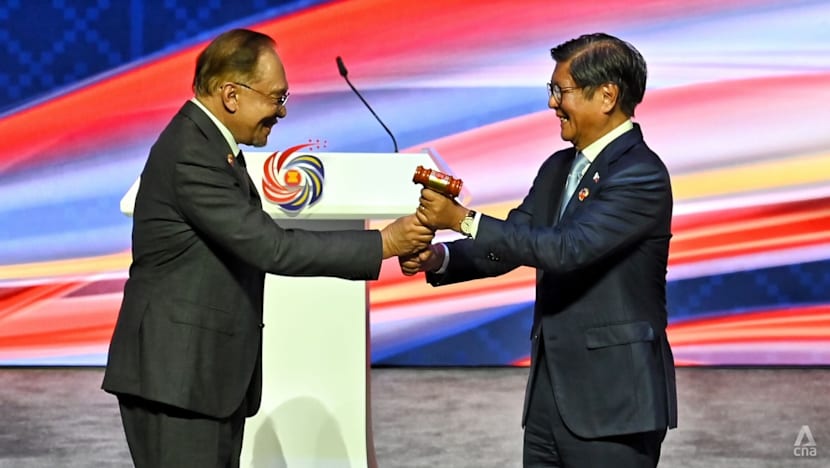Anwar hits back at critics of Trump visit, outlines ASEAN’s progress with Malaysia as chair
The Malaysian prime minister said he raised many issues - including the Gaza conflict - with the US president during their limousine ride from the airport, adding that Donald Trump was “a good listener”.

Malaysia’s Prime Minister Anwar Ibrahim (centre) speaks during a press conference after the 47th ASEAN Summit ended in Kuala Lumpur on Oct 28, 2025. (Photo: CNA/Fadza Ishak)

This audio is generated by an AI tool.
KUALA LUMPUR: Malaysia Prime Minister Anwar Ibrahim has defended his hosting of United States President Donald Trump at the Association of Southeast Asian Nations (ASEAN) Summit, rebutting criticism that the pomp in Trump’s welcome was “overly festive” and “inappropriate”.
He rejected claims of preferential treatment for the US, pointing to how ASEAN signed an enhanced trade pact with China at the summit and related meetings that took place from Oct 26 to 28.
The summit made Malaysia the “centre of the world’s attention” while maintaining the bloc’s stance of centrality and neutrality, said Anwar, whose country is the 2025 ASEAN chair.
“The whole world was looking at us with Trump (and Chinese Premier) Li Qiang (present). We were signing agreements with both. We also invited Brazil, which is not on good terms with Trump,” said Anwar at a press conference on Tuesday (Oct 28) evening after the summit ended.
Besides leaders of ASEAN countries, other attendees included Brazil President Luiz Inácio Lula da Silva, South African President Cyril Ramaphosa and new Japanese Prime Minister Sanae Takaichi.
Trump’s visit to Malaysia resulted in protests led by opposition party Parti Islam Se-Malaysia and civil society groups, which are against the US’ perceived support of Israel in the Gaza conflict.
Anwar’s handling of Trump’s visit was also criticised by opposition leader and former PM Muhyiddin Yassin, who called the welcome party for the US president “inappropriate” given the plight of the Palestinian people in Gaza.
“The overly festive, cheerful, and symbolic reception raises a serious question: Is Malaysia now measuring its diplomatic dignity based on the status of its guests rather than on humanitarian principles?” said Muhyiddin.
Trump was welcomed by dancers and a band when he arrived at the Kuala Lumpur International Airport on Sunday morning. In a light moment, he danced to the tune of Hawaii-Five-O and was joined by Anwar. The leaders then rode together in Trump’s presidential limousine dubbed The Beast.
Criticising Anwar, Muhyiddin said: “The prime minister’s act of dancing with Trump has deeply hurt the feelings of all Malaysians who sympathise with the plight of the Palestinian people.”
Anwar told the media he raised many issues including the Gaza conflict with Trump on their car ride. Trump was “a good listener”, he said.
“I was in a fortunate position … to have a four-eyed discussion with him in confidence and I must confess that he listens very attentively to our views,” he said.
“I did my best to represent the voice of conscience that Malaysians would want us to do,” added Anwar.

While he lauded Trump for the Gaza ceasefire, Anwar said he told Trump that the peace agreement needed to be “more comprehensive” and include the “needs and interests” of Palestinians.
Trump responded that this was the first phase of the ceasefire and that they were “working on it”, Anwar said.
“Of course, there are many things he said in private, which is, to me, enlightening. And of course, I was happy to hear that. These are private conversations between leaders, and you have to respect that,” he added.
The Gaza ceasefire agreement, a key part of Trump’s 20-point plan to end the Gaza war, went into effect on Oct 10. It remains fragile amid disputes over the pace of hostage and body exchanges and the delivery of humanitarian aid.
The two-year conflict started when militant group Hamas attacked Israel on Oct 7, 2023, killing about 1,200 people and abducting around 250 hostages. Israel’s retaliatory campaign in Hamas-controlled Gaza has killed more than 67,000 people and displaced nearly the entire population, according to Palestinian health authorities.
On Sunday, Trump also witnessed a joint declaration on peace and security between Cambodia and Thailand following a deadly escalation of their border dispute in July, and inked a flurry of deals on trade and critical minerals.

He signed bilateral trade agreements with Malaysia, Cambodia, Thailand and Vietnam, and critical mineral supply chain memoranda of understanding with Thailand and Malaysia.
At the ASEAN-US Summit, Trump told ASEAN leaders they could look to the US for full support and friendship for years to come.
“Our message to the nations of Southeast Asia is that the US is with you 100 per cent and we intend to be a strong partner and friend for many generations to come,” he said.
At Tuesday’s press conference, Anwar pointed to China and ASEAN signing the second upgrade of the ASEAN-China Free Trade Area (ACFTA) a day after Trump’s departure.
The FTA, first inked in 2002, was China's first free trade agreement and ASEAN’s first with a major external partner. The latest version covers areas such as the digital and green economies as well as supply chain connectivity.
“If we are scared of the US, why would we have signed this agreement (with China) a day after Trump leaves? This is (part of diplomacy),” Anwar said.
NO CHAIRMANSHIP CAN “RIGHT EVERY WRONG”
Asked to summarise his achievements during Malaysia’s ASEAN chairmanship, Anwar said a priority was to secure regional peace and strengthen economic fundamentals.
He cited progress on the ASEAN Power Grid – which has a new financing facility – and “diplomatic efforts to ensure there is peace”.
“That's why the whole world is looking at us (ASEAN), because it is peaceful and has potential to propel economic growth. Now, have we achieved everything? No, certainly not,” said Anwar.
At the closing ceremony, Anwar had joked that “it was a relief” for Malaysia to hand over the chairmanship to the Philippines, and said there was more work to be done.

“We recognise that no chairmanship – nor even a generation – can right every wrong,” said Anwar. “What matters is that each act of courage, each small step, helps to arc our region closer to hope and justice.”
Under Malaysia’s chairmanship, ASEAN members can enjoy “quiet satisfaction” from seeing dialogue unfold, including with its partners outside the bloc, he said.
At the press conference, Anwar was also asked about the absence of a joint statement from the East Asia Summit on Monday, and why no consensus was apparently reached.
The East Asia Summit involves 19 participants, namely the 11 ASEAN member states, Australia, China, India, Japan, New Zealand, South Korea, Russia and the US.
Without addressing whether there was a consensus, Anwar replied that many countries including Russia, Myanmar, US and China were present and willing to discuss issues.
“We may disagree … but the position, and the consensus of ASEAN, within ASEAN, is to ensure that there is engagement. We should not stop engaging,” he said.

















